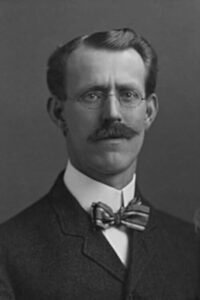
Jack North’s Treasure Hunt
The other person was an eighteen-year-old with brown, curly hair, blue eyes, and a round, robust figure. His name was John North, and he was the son of a couple in humble circumstances.
“Take care!” cried the man, “that sneak will get in ahead of you, and then a snap of your little finger for your chance of getting the job at Fowler’s.”
Jack North did not stop to hear his friend through. He was very much in need of a situation, and he knew the young man who had rushed in ahead of him as a bitter enemy. That fact, coupled with his desire to get work, caused him to dash up the street as fast as he could run.
Naturally, the appearance of the two running at such a headlong pace aroused the attention of the passers-by, all of whom stopped to see what it meant. Others rushed out of their houses, offices, or workshops to ascertain the meaning of the race, until the street was lined with excited, anxious men, women, and children.
“Is it fire?” asked an old, gray-headed man, and another, catching only the sound of the last word, repeated it and thus a wild alarm was quickly spread.
Meanwhile Jack North had found that he could not overtake his rival. He was not a fleet runner, while the other had gotten a start of him, which he could not hope to make up.
But he was too fertile in his resources to despair. He was never known to give up a contest that he had once fairly entered. This persistence in whatever he undertook was the secret of Jack North’s wonderful success amid environments that must have discouraged less courageous hearts.
Still it looked to his enemy, as the latter glanced back to see him leisurely turn into a side street leading away from their destination, that he had nothing further to fear from him.
Read or download Book
Roy Rockwood
“Roy Rockwood” was a pseudonym used by both Edward Stratemeyer and for books produced through his Stratemeyer Syndicate.
Edward L. Stratemeyer (October 4, 1862 – May 10, 1930) was an American publisher, writer of children’s fiction, and founder of the Stratemeyer Syndicate. He was one of the most prolific writers in the world, producing more than 1,300 books himself, and selling more than 500 million copies. He also created many well-known fictional book series for juveniles, including The Rover Boys, The Bobbsey Twins, Tom Swift, The Hardy Boys, and Nancy Drew series, many of which sold millions of copies and remain in publication. On Stratemeyer’s legacy, Fortune wrote: “As oil had its Rockefeller, literature had its Stratemeyer.”
Early life
Stratemeyer was born the youngest of six children in Elizabeth, New Jersey, to Henry Julius Stratemeyer, a tobacconist, and Anna Siegel. They were both from Hanover, Germany, immigrating to the United States in 1837. Although they were German, he and his siblings were educated in English and spoke English to each other.
Growing up, Edward read the likes of Horatio Alger and William T. Adams, writers who penned beloved rags-to-riches tales of the hardworking young American. These stories greatly influenced him. As a teenager, Stratemeyer operated his printing press in the basement of his father’s tobacco shop, distributing flyers and pamphlets among his friends and family. These included stories called The Newsboy’s Adventure and The Tale of a Lumberman. After he graduated from high school, he went to work in his father’s store. It wasn’t until the age of 26 in 1888 that Stratemeyer sold his first story, Victor Horton’s Idea, to the popular children’s magazine Golden Days for $76—over six times the average weekly paycheck at the time.
Career
Stratemeyer moved to Newark, New Jersey, in 1890 and opened a paper store. He ran his shop while continuing to write stories under pseudonyms. He was able to write for many genres including detective dime novels, westerns, and serials that ran in newspapers. In 1893, Stratemeyer hired the popular dime-novel writer Gilbert Patten, according to Patten’s autobiography, Frank Merriwell’s ‘Father’: An Autobiography by Gilbert Patten (Burt L. Standish) (U OK Press 1964). Patten writes that he did not like Stratemeyer. (A less-reliable source says that Stratemeyer was hired by Patten to write as an editor for the Street & Smith publication Good News. In 1894, he published his first full-length book, Richard Dare’s Venture, which was the first in his Bound to Succeed series. It contained autobiographical content and was similar to Alger’s rags-to-riches story formula.
In 1899, Horatio Alger wrote Stratemeyer as editor of the Good News, asking him to finish one of his manuscripts. Alger was in poor health at the time. When Alger died later the same year, Stratemeyer continued to edit and finish several of Alger’s other books. That same year, after Alger died, Stratemeyer wrote and published The Rover Boys, which became a tremendously popular series in the vein of the classic dime novel. The Rover Boys was described as “The first highly successful series by Edward Stratemeyer; each volume had a preface from Edward Stratemeyer himself, thanking his readers and touting the other books. It’s generally accepted that Stratemeyer wrote all of the books.” He said this series was his personal favorite. Stratemeyer formed the Stratemeyer Syndicate in 1905 and hired journalists to write stories based on his ideas. He paid them a flat rate for each book and kept the copyrights to the novels.
Personal life
Stratemeyer married Magdalena Van Camp, the daughter of a Newark businessman, on March 25, 1891. The couple had two daughters: Harriet Stratemeyer Adams (1892–1982) and Edna C. Squier (1895–1974), both of whom would later take over the future Stratemeyer Syndicate. Stratemeyer enjoyed the outdoors and often took annual summer trips to the Great Lakes, Lake George, and Lake Champlain with his family. They traveled as far as the West Coast and Yosemite. A humble man, he never sought public attention and preferred living a private and quiet life with his family at their home on N. 7th Street in the Roseville section of Newark. His relationships with his daughters were described as “warm”, and his daughter Harriet recalled that it was a lively atmosphere growing up. Stratemeyer was a member of the Roseville Athletic Club and the New Jersey Historical Association. Stratemeyer died at age 67 in Newark, New Jersey on May 10, 1930, of lobar pneumonia and was buried in Evergreen Cemetery in Hillside, New Jersey. On May 12, 1930, two days after his death, the New York Times reported that his Rover Boys series “had sales exceeding 5,000,000 copies”.






